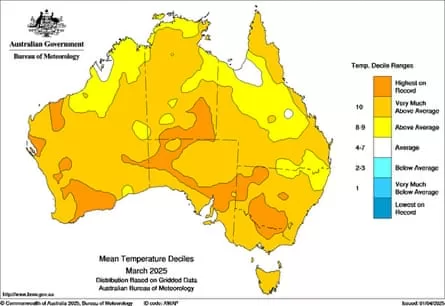Australia has experienced its hottest 12-month period on record, ending with its hottest March on record, with last month seeing temperatures 2.41C above average, the Bureau of Meteorology has confirmed.
The bureau said its data going back to 1910 showed the 12 months ending in March 2025 averaged 1.61C above average – the hottest of any 12-month period, beating the previous 1.51C mark set from January to December 2019.
The 2.41C record for March easily beat the previous 2.03C mark set in 2019.
March also had the hottest overnight temperatures for that month, at 2.53C above the 30-year average between 1961 and 1990. March 2025 beat the previous 2.11C mark set in 2016.
Australia just had its warmest spring-summer on record in 2024-25, with the six months from September to February 1.98C above average. The previous record was 1.68C set in 2019-2020.
“It’s the same shit, different year,” ANU climate scientist Prof Sarah Perkins-Kirkpatrick said. “I am sure everyone is now getting fatigued that these records keep falling. It’s now incredibly predictable.”

Dr Simon Grainger, a senior climatologist at the bureau, said Australia also had its joint warmest start to any year at 2.08C above average, tied with the January to March period of 2019.
He said: “It has been the warmest 12 months on record. That is pretty remarkable to beat a record like that by a tenth of a degree.”
Grainger said March had seen an absence of low-pressure systems that would usually bring cooler conditions across the south of the country.
“We just didn’t see temperatures cool off at any time during the month. This is all part of a global pattern of record warm temperatures that we have been seeing.”
New South Wales and South Australia had their hottest March months on record for average temperatures. Victoria had its second-hottest month.
Western Australia had a clean sweep, recording its hottest March for average temperatures, minimum temperatures and maximum temperatures.
after newsletter promotion
Records for hottest overnight temperatures across March were broken in all states and territories except Tasmania and Victoria.
Australia has not had a March cooler than average since 2012.
Dr Andrew King, a climate scientist at the University of Melbourne, said the 12-month record had been broken by a significant margin, given it was averaged across the entire continent.
“We are warming the planet at a significant rate now and we continue to put record amounts of CO2 in the atmosphere,” he said.
“This is especially concerning as we are still seeing record levels of global greenhouse gas emissions from fossil fuel use.”
Perkins-Kirkpatrick said global heating likely played a role in the record-breaking temperatures but weather patterns had also been conducive to warmth.
“With the exception of Cyclone Alfred, there were calm conditions that were pretty persistent with high pressure systems hanging around,” she said.
“But we’re just getting hotter and hotter. These records are substantial and, yes, climate change. We can’t say for sure that any one season is down to climate change but we know everything is warming consistently.”
On rainfall, Queensland had its third wettest march. Rain amounts were close to average in other areas except Tasmania, which had its 12th driest March since national rainfall records started in 1900.
